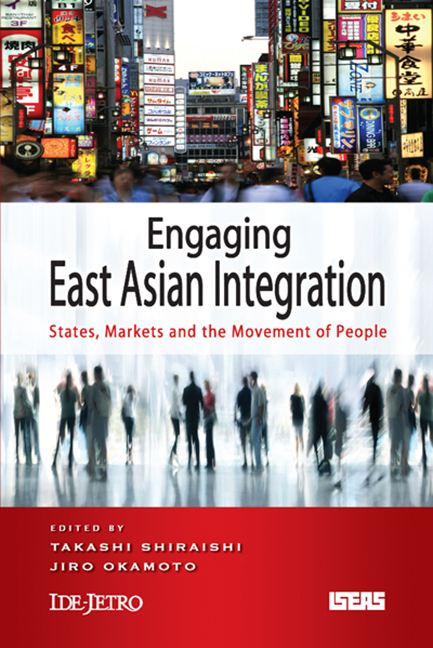Book contents
- Frontmatter
- Contents
- Foreword
- List of Figures and Tables
- Contributors
- 1 Introduction
- Part I EVOLUTION OF EAST ASIAN INTEGRATION
- 2 Japan and East Asia in the American Imperium
- 3 Building a Neighbourhood — One Policy at a Time: The Case for Deeper Economic Integration in East Asia
- Part II STATES, MARKETS AND THE MOVEMENT OF PEOPLE
- Index
2 - Japan and East Asia in the American Imperium
from Part I - EVOLUTION OF EAST ASIAN INTEGRATION
Published online by Cambridge University Press: 21 October 2015
- Frontmatter
- Contents
- Foreword
- List of Figures and Tables
- Contributors
- 1 Introduction
- Part I EVOLUTION OF EAST ASIAN INTEGRATION
- 2 Japan and East Asia in the American Imperium
- 3 Building a Neighbourhood — One Policy at a Time: The Case for Deeper Economic Integration in East Asia
- Part II STATES, MARKETS AND THE MOVEMENT OF PEOPLE
- Index
Summary
The United States plays the central role in a world of regions. Gone are the clearly demarcated, rival blocs of East and West. Since the end of the Cold War, the collapse of socialism has made anachronistic the distinction between a First and a Second World. And even before the disintegration of the Soviet Union, the Third World had ceased to exist as a cohesive force in world politics. The distinction between an industrialized North and a non-industrialized South became outdated with the rapid industrialization of numerous poor countries, while the gap in income and wealth within and between North and South has widened. The American imperium is now the hub in a wheel with many regional spokes. In short, world politics has undergone a huge shift from bloc bipolarity to an American-centred regionalism.
In this chapter, I wish to develop three interrelated arguments. First, through actions that mix its territorial and non-territorial powers, the American imperium has been having a profound effect on regions. The American imperium is not only an actor that shapes the world, but it is also a system that reshapes America. Although regions are conceptualized, alternatively, in materialist, ideational, and behavioural terms, my understanding of the term draws on all three traditions in an eclectic manner, trading in a false sense of precision for an encompassing sense of family resemblance between different instances of this thing we call region. Each of the world's major regions has at its core either supporter states, such as Japan or Germany, or regional pivots, such as France and Britain, China and Indonesia, Nigeria and South Africa, or Brazil and Argentina. I call Japan and Germany supporter states because they were the only major powers that challenged the Anglo- American world order through war in the twentieth century, suffered total defeat, and only then came to support the global order. Pivot states do not share this historical experience, but instead a structural affinity in terms of the distribution of material capabilities in different world regions.
- Type
- Chapter
- Information
- Engaging East Asian IntegrationStates, Markets and the Movement of People, pp. 13 - 45Publisher: ISEAS–Yusof Ishak InstitutePrint publication year: 2012



